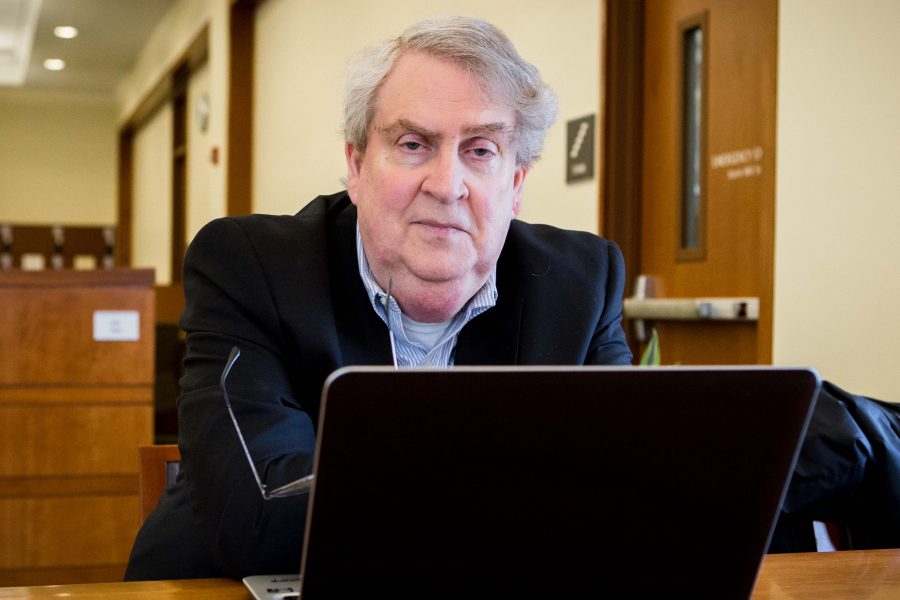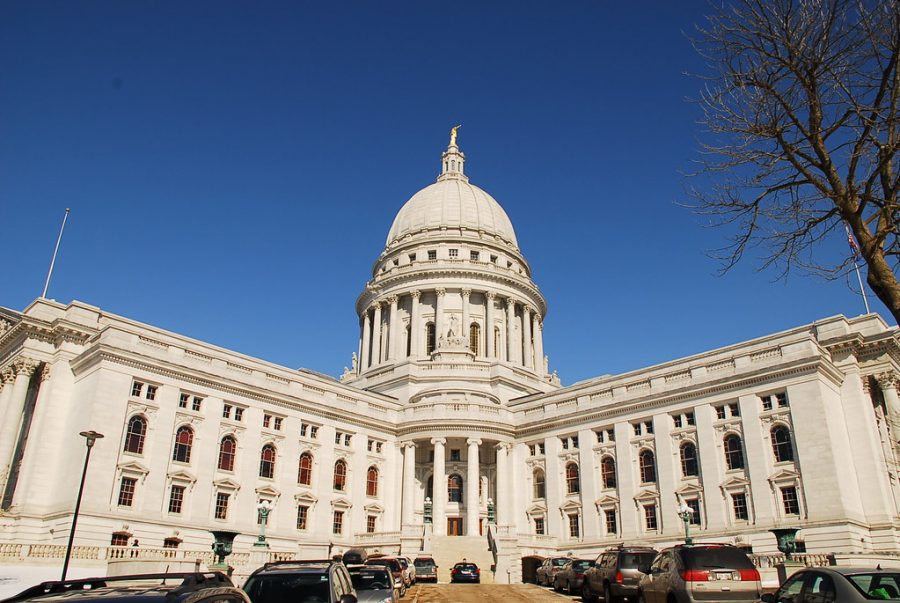The Wisconsin Supreme Court will hear suspended political science professor John McAdams’ suit against Marquette University Thursday, April 19. This is everything the Marquette Wire knows about the case:
- McAdams was placed on suspension in 2015 after a 2014 blog post. He remains suspended and plans to rejoin the faculty if the court rules in his favor.
- McAdams argues that his dismissal violated his contractually-promised academic freedom, while Marquette contends the decision was not viewpoint-based and therefore not a violation.
- McAdams was never formally reprimanded for several prior incidents involving faculty and students on his blog, which he said served a journalistic purpose.
McAdams received a letter from the dean of Marquette’s College of Arts & Sciences, Richard Holz, in January 2015 notifying him that the administration planned to revoke his tenure and dismiss him from the faculty. It was a response to a blog post written by McAdams in November 2014.
McAdams’ blog post on his site, The Marquette Warrior, named a graduate student teaching assistant who a student said did not allow for discussion of gay marriage. That account was not confirmed, but the student did record an interaction with the student teacher after class and took that recording to both the College of Arts & Sciences administration and McAdams.
McAdams then blogged about the incident and linked to the student teacher’s website.
Rick Esenberg, McAdams’ lawyer, said McAdams called the student teacher for comment prior to publishing the article, and the student teacher had not wished to reply.
The post described the student teacher as a liberal and said they were unwilling to argue ideas they disagreed with. The student teacher defended their actions, saying they were discouraging homophobic language in class.
The blog post received national attention, and it led to the Westboro Baptist Church’s picket of campus in December 2014.
The student teacher received more than 100 aggressive and harassing emails, according to university resources on the case, and they left Marquette for another university soon after.
Ralph Weber, Marquette’s lawyer, referred to McAdams’ post as “doxing,” or the intention to generate hostility toward a subject, and he said the post provided the tools needed for readers to take action against the the student teacher.
Esenberg said the student teacher didn’t leave the university because of the harassment, but because the attention gave the graduate student an opportunity to transfer to a university they previously were denied admittance to.
In September 2015, a Faculty Hearing Committee met to assess the case. The committee concluded that Marquette abused its power by dismissing McAdams without prior recommendations from the FHC, but McAdams’ behavior ultimately warranted an unpaid suspension of no more than two semesters.
McAdams’ side has argued that the FHC’s handling of the case was unfair, particularly because it allowed a faculty member to remain on the committee after they had signed an editorial supportive of the graduate student and critical of McAdams’ blog post.
“Marquette wants to say the FHC was a jury of McAdams’ peers,” Esenberg said. But, because the professor had signed the editorial, Esenberg said they should have recused themselves.
The FHC defended its decision to not replace the professor in its 2015 report, writing, “requiring the FHC to be composed only of faculty … who hold no views on the matter would be … impractical.”
McAdams said while that may be true, it would have been easy for the committee to find another faculty member who had not published that opinion.
University President Michael Lovell accepted the FHC recommendation and attached requirements of his own. Lovell requested that, for McAdams to be reinstated, he had to express regret for the harm caused to the student teacher and to privately apologize to them. McAdams refused and remains suspended without pay.
Claiming the university violated his contract, McAdams filed a suit against Marquette in May 2016. That violation, McAdams said, denied him rights promised by the Faculty Statutes, which say dismissal cannot be used to “restrain faculty members in their exercise of academic freedom or other rights guaranteed them by the United States Constitution.”
McAdams said he believes his dismissal was viewpoint discrimination. Weber said McAdams’ history of publishing controversial blogs proves it is not.
“If he was being disciplined for his conservative views, the actual track record makes it hard to believe,” Weber said.
A Milwaukee County judge, David Hansher, issued a 33-page ruling in Marquette’s favor in May 2017, stating that Marquette was within its rights to dismiss McAdams.
Hansher acknowledged academic freedom in the ruling, but he said it did not permit faculty to intimidate others.
Academic Freedom
Academic freedom is unlike most First Amendment cases because the First Amendment only prevents the government from intervening in speech, not private entities, Marquette political science assistant professor Paul Nolette said.
Marquette is a private university, so its employees aren’t automatically protected under the First Amendment, but, its employment contract promises to protect free speech similar to the constitution, Nolette said. He added that this case is more about contract law than the constitution.
Nolette said there isn’t a legal precedent that directly applies to the case, but generally, courts tend to defer to colleges and universities in contract disputes. Though, he said the attention being focused on the speech aspect may impact the court’s decision.
The FHC was unable to interpret the clause regarding constitutional rights, stating in its report, “it is difficult to discern how the committee should apply an uncertain legal doctrine as developed in courts to a hypothetical situation in which Marquette is a public institution.”
Weber said the case isn’t about the First Amendment, but academic freedom, which he said is often misinterpreted.
“People often confuse academic freedom and free speech. They’re not the same thing,” Weber said.
Weber explained that academic speech, unlike the First Amendment’s protected speech, is by nature subject to content-based evaluations.
“Academic speech is the opportunity for an academic to research, write and teach in accordance with professional standards,” Weber said.
The American Association of University Professors established a definition for academic freedom in 1915, which Marquette later adopted. That definition has three parts: the freedom of inquiry and research, classroom and teaching freedom and the “freedom of extramural utterance and action.”
Nolette said the blog post, and McAdams’ blog in general, “is the sort of thing protected by academic freedom.” He said the ramifications of the post are what make the distinction.
Weber said that, had McAdams’ blog post excluded the student teacher’s name and information, he would not have been disciplined, and so the case is not really about academic freedom.
Part of the difficulty for the court will be deciding what the university was punishing McAdams for, Nolette said.
Aaron Nisenson, AAUP’s senior counsel, said the organization filed a brief on McAdams’ behalf because his case squarely addressed academic freedom, a principle the AAUP had a hand in establishing.
The AAUP took issue with Lovell’s handling of the situation, Nisenson said, particularly the requirement that McAdams issue an apology and retract the statements made in his blog post.
“By demanding a retraction, it appeared the president was asking McAdams to renounce his opinions,” Nisenson said. “We defend the rights of faculty members to take controversial stands.”
Weber said McAdams was never asked to renounce his opinions or to retract his post.
Past incidents
McAdams named undergraduate students and faculty members in blog posts in the past, but he was never formally reprimanded.
In March 2008, McAdams named an undergraduate student who was the student media advertising director in a blog post, questioning the rejection of an advertisement discouraging the use of emergency contraception.
He removed the student’s name upon learning they were not involved in rejecting the ad, according to the FHC report.
Later, in February 2011, McAdams named the chair of a student organization facilitating a production of “The Vagina Monologues” on campus. He called the student at their permanent residence and blogged about them after they complained. Then-provost John Pauly met with McAdams but levied no formal rebuke.
In response to the post, the student received an aggressive email from somebody not affiliated with the university. The student filed a harassment claim against McAdams as well as an “MU Stay Away” order with the Marquette Public Safety Department, according the the FHC report.
McAdams denied the harassment and said Campus Safety did as well. He said he tried to contact the student for a comment regarding an article he was writing, and he used publicly-listed contact information to do so.
“Of course, a couple of emails and phone calls is not harassment,” McAdams said.
The report notes a few other incidents with faculty but no more with students, including that McAdams used the chances of being mentioned on his blog to intimidate faculty.
McAdams said in each of these incidents, he was acting according to journalistic standards, and that he only names undergraduate students who are acting as “highly visible political activists” or as officers for student organizations. He said he does not name undergraduate students acting solely in an academic capacity.
“I have no reservations about naming someone in an official position at Marquette who does something questionable,” McAdams said. He continues to name the student teacher in blogs regarding the case.
Margaret Hoffman was a graduate student in the history department during the incident and said, “Graduate student instructors are not faculty members … What McAdams did was an abuse of his power and his authority and the privilege he has as a tenured member of faculty.”
Hoffman is still a graduate student and a current Raynor Fellow. She said she remembers holding emergency meetings with her fellow graduate students to discuss how to handle the possibility of students recording them in class. She said they also met with faculty to discuss the boundaries between their two roles.
“It often happens to female teaching assistants because of that power differential,” Hoffman said.
The Wisconsin Supreme Court is currently composed of four conservative and two liberal justices. Incoming justice Rebecca Dallet does not join the court until August and Justice Annette Ziegler recused herself. The court will hear oral arguments for the case this Thursday, April 19.
Esenberg said he can’t predict the outcome of the case, but he is confident that McAdams’ blog post was protected by academic freedom.



Allan Klayden • Apr 17, 2018 at 2:03 pm
Thank you, Marquette Wire. You have here provided a more balanced and honest account of this ridiculous situation than 90% of the national media and, most particularly, the university itself. This is a case of contract violation plain and simple, and Marquette is clearly in the wrong. There was no harassment on Dr. McAdams’ part. There was no “doxing.” Ms. Abbate left Marquette for a better opportunity at a far superior philosophy department (and no doubt the notoriety she gained from this case helped her in that regard). It’s sad and telling that Marquette administration feels compelled to lie about the facts of the case and is spending university money buying major advertisements to promote those lies.
Paul Trotter • Apr 17, 2018 at 12:35 pm
Think about this for a moment. McAdams is a full professor who chose to quite publicly bully a graduate student TA. My God sir – have you now decency? I can’t imagine any of the professors I had at MU doing such a thing. It’s just not in the spirit of Ignatius. Apologize McAdams and put this issue to rest.